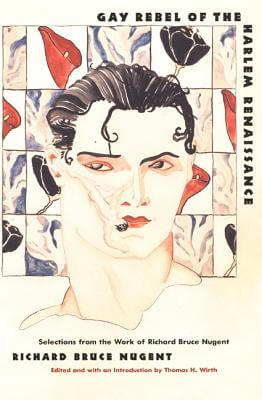Book Review: Gay Rebel of the Harlem Renaissance: Selections from the Work of Richard Bruce Nugent
by Richard Bruce Nugent
List Price: $24.95(May 23, 2002)
Nonfiction, Paperback, 312 pages
More Info ▶
Book Reviewed by Thumper
Richard Bruce Nugent is the best well-kept secret of the Harlem Renaissance.
Nugent isn’t unheard of in the annals of the Renaissance; he’s unseen. Gay Rebel
of the Harlem Renaissance solidifies the phantom of Richard Bruce Nugent by
collecting a number of his short stories, articles, interviews, drawings and
paintings. The anthology establishes Nugent’s rightful place amongst
Langston
Hughes, Claude McKay,
Zora Neale Hurston,
Countee Cullen, and other
Harlem
Renaissance luminaries.
The anthology begins with an extraordinary introduction, a brief biography of
Nugent, written by Thomas Wirth, the editor. The biography unveils Nugent’s
works and opens a window to his character: a proud gay man who would not hide
his homosexuality in the closet. While he may not have been the most renowned of
the Renaissance artists, Nugent was, perhaps, the most romantic, because he did
not compromise his art by censoring his homosexual identity. This personal stand
resulted in the majority of his works going unpublished.
Gay Rebel of the Harlem Renaissance is an unexpected, shiny-wrapped Christmas
gift — one that keeps giving all year round. One of the first stories in the
collection, perhaps his most popular and important piece, is Smoke, Lilies and
Jade. I first read Smoke, Lilies and Jade in the Black Like Us anthology a few
months ago and flipped. The main character reflects on his life, his love for a
long time girlfriend and his attachment to his male lover who he refers to as
Beauty. The story is amazing. Right then, I knew Nugent was a heavy hitter. Gay
Rebel of the Harlem Renaissance bears this out.
I was most intrigued with Gentleman Jigger, an unpublished novel written by
Nugent that is excerpted in this collection. As Wirth explains in his
introduction, Gentleman Jigger covers the same ground as Wallace Thurman’s
Infants of the Spring, with similar characters and basic story lines. I enjoyed
the excerpt and felt a little cheated that I didn’t have the opportunity to read
the entire book from beginning to end.
I could have stopped reading the anthology after reading Gentleman Jigger and
Nugent’s earlier works and been perfectly, snugly content. As the anthology
progressed, Nugent’s writings grew tighter and intriguing. The "After The Harlem
Renaissance" section consists of short stories and excerpts from Nugent’s later
novels. These writings show maturity, confidence and daring that isn’t present
in his earlier work. In the latter stories, some inspired by Greek classics,
Nugent becomes more adventurous, pushing and adapting boundaries, yet remaining
faithful to the foundation of these stories. I enjoyed these stories the most.
After reading this anthology, I was left to ponder some "What If?" questions:
What if Nugent’s earlier books and short stories had been published despite
their matter-of-fact treatment of homosexuality? Would
James Baldwin be as
revered today? Should Nugent be more respected today because he refused to
concede and subject his stories to the editor’s knife or should he be considered
a fool because he didn’t?
Richard Bruce Nugent’s name may not roll off the pages of history books
connecting him to the Harlem Renaissance. Gay Rebel does an extraordinary effort
to restore Nugent to his rightful place by presenting him to a new audience. If
it does nothing else than whet our appetites for more, Gay Rebel of the Harlem
Renaissance has accomplished an extraordinary feat.

